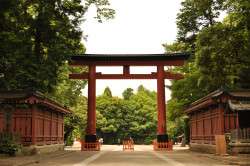
Originally published on metropolis.co.jp on October 2012

This is the first of a series of Tohoku stories to be published on the Metropolis website.
Extra spice is good. My marinara sauce always contains triple the basil. My jokes border on tall tales. What I hear in Tohoku, however, needs no additives. Nineteen months after March 11, there is still pain. Stories stand alone, powerful, beautiful and unbelievable.
Simply put, Takayuki Niinuma is a badass. The local bosozoku (teenage motorcycle gang) leader in Ofunato in his teenage years, he dropped out of school twenty years ago, and was kicked out by his father. At seventeen, with ¥10,000 in his pocket, he made his way to Tokyo to work his way up the underground ladder in Kabukicho. “I was one of those guys you didn’t want to mess with,” he tells me. “I was really bad.”
At twenty-six, he returned to Ofunato. His wife and six-year-old daughter lived there, and while he’d sent money home regularly, he had been an absentee father and husband. In his words: “I came back for the kid.”
Unable to shake off his old reputation, he began working as a tattoo artist. He brought part of his persona back with him. Flashy cars, gold jewelry, a foul mouth. He didn’t blend in.
He was thirty-six when the tsunami hit. The night of March 11, he drove around Ofunato looking for his wife and kids. At the largest evacuation shelter in town, a concert hall, he cornered city hall officials asking who was where. No one knew. Frustrated and angry, he went into the office and grabbed all the stationery he could find.
“All you city hall guys. Get everyone here.”
In shock, the officials did as told. Niinuma gave each man a notebook and pen and ordered them to go to each shelter and take names. This turned into the list the entire city used over the next days to track down the missing.
When Niinuma first asked for help in raising funds to buy solar panels I was skeptical. Who is this guy? Is he for real? We’ve since talked long into the night. Asked over and over why he’s doing this, his answer is consistent: “I’m atoning.”
I wasn’t sure I believed Niinuma when he told me how he’d drive around the countryside looking for homes without electricity. I didn’t think this was possible in Japan. There are people in Tohoku still living without electricity?
But having tagged along with him on several drives, I know now I’m wrong. For the past 17 months Niinuma has single-handedly tracked them down. And he’s installed donated solar panels on many of these people’s homes and businesses.
Niinuma is not soft-spoken. His language is coarse, rough, and nothing about him is gentle. But now he’s sold all his cars. His jewelry collection has been reduced to two silver bands, a wedding ring, and another he received from his now 17-year old daughter. He’s earned no income since the tsunami. “I’ve made money before. I can make it again. So long as my family can eat, we’re fine.”
Not shy about how much pain he’s caused people in his life, he feels drawn to help those at the very bottom. Tohoku is riddled with people the municipalities have forgotten. There are too many individuals and families yet to be reached.
Here is an incredible individual. A man with a profoundly troubled past; the stubbornness, dedication, and commitment with which he approaches his mission is humbling. For that and much more, I’ll stick with him.
The Kizuna Project, through which Takayuki Niinuma operates, is the first Cabinet-approved NPO in Iwate Prefecture. To find out how to help, see www.kizuna-sanriku.jp.







